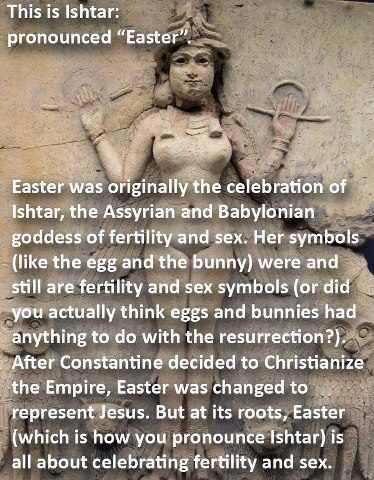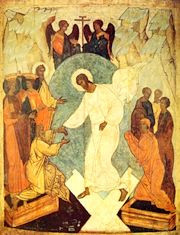I had always assumed that the Christian equation of Jesus with the Paschal Lamb came from the relationship of Peach (Passover) to Easter. The Wikipedia supported my idea: Paschal Lamb can refer to:
- Korban Pesach, in Judaism
- Lamb of God, in Christianity
- Sacrificial lamb
- Pascha (Greek: Πάσχα), also called Easter, is the feast of the Resurrection of the Lord. Pascha is a transliteration of the Greek word, which is itself a transliteration of the Hebrew pesach, both words meaning Passover. (A minority of English-speaking Orthodox prefer the English word ‘Pasch.’)
Turns out we the origins are very confused and Easter has no historic relationship to Passover/ The flick above (probably from an Adventist) talks about the derivation of Easter from Germanic holidays, “paganism.” The argument rests some on the worship of Ishtar .. and the claim that Ishtar’s name became Easter.
 on Facewbook corrected me:
on Facewbook corrected me:  “There is, however, a connection which may be drawn between the pre-Christian celebrations and the feast of the Resurrection of Christ. Just as Christ’s incarnation is the ultimate fulfilment of the best hopes of all “natural” religion, so can Pascha be understood as being the ultimate springtime of mankind. The pre-Christian celebrations of the renewal of creation in the Spring find their completion in the Resurrection, the passage from death to life of the incarnate Son of God, and with him all creation.”
“There is, however, a connection which may be drawn between the pre-Christian celebrations and the feast of the Resurrection of Christ. Just as Christ’s incarnation is the ultimate fulfilment of the best hopes of all “natural” religion, so can Pascha be understood as being the ultimate springtime of mankind. The pre-Christian celebrations of the renewal of creation in the Spring find their completion in the Resurrection, the passage from death to life of the incarnate Son of God, and with him all creation.”